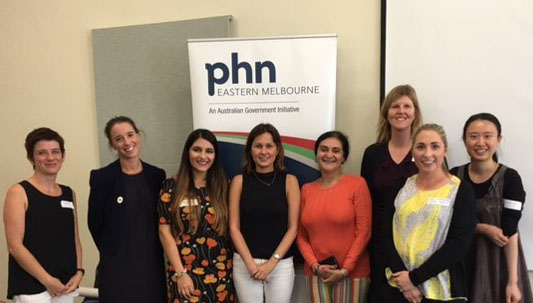Support services are now much more accessible for carers from Culturally and Linguistically Diverse (CALD) backgrounds in the City of Monash, thanks to a partnership between Eastern Melbourne Primary Health Network (EMPHN) and Multicultural Centre for Women’s Health (MCWH).
The CALD Carers Project, which was run by MCWH and funded by EMPHN, helped communities and support services identify and assist carers from Chinese and Indian backgrounds. EMPHN CEO Robin Whyte said the project was about overcoming challenges to identify CALD carers and get the conversation started about the type of help they can access.
“An important part of the process was providing culturally tailored sessions where carers, carer recipients and community members could discuss the challenges they face and tell us what would help,” she said.
MCWH Executive Director Adele Murdolo said carers from CALD backgrounds are often a hidden group with unique challenges to getting help, largely due to language barriers and not knowing where to turn for support.
“An additional barrier for CALD carers is they often don’t identify as ‘carers’ because many consider looking after a family member as a normal and expected part of life,” she said.
The project involved delivering in-language education sessions to CALD communities and to support service organisations.
The community sessions included information about being a ‘hidden carer’, multi-lingual resources about available services, and how to manage the physical, psychological and social impacts of being a carer.
Sessions provided to carer support organisations aimed to increase understanding of supporting carers from CALD backgrounds, including the unique barriers, how to identify ‘hidden carers’ and practical tools for helping CALD carers.
Of carers surveyed, 98 per cent now say they understand the impact being a carer has on their lives, and 97.6 per cent know more about supports available.
Additionally, each participant was able to identify at least one or two ‘hidden carers’ they know as a result of the community awareness sessions. It is estimated that between 462 and 749 carers were identified among participants.
This project targeted the City of Monash where there is a high number of residents from non-English speaking backgrounds (52.6%) or who were born overseas (51.6%). A large proportion of these residents are part of the Chinese and Indian communities.
The project was supported by funding by the Australian Government under the PHN program.
Case study, Ying Yang’s Story
I’ve lived in Australia for some years now. I used to work full time in a factory doing production line planning and administration, but now I work part-time and in my spare time I enjoy reading and gardening.
In the past, I cared for both my father-in-law and my mother-in-law. My father-in-law has now passed away and I still care for my mother-in-law.
The Multicultural Centre for Women’s Health has helped me to learn about who to contact for help with home care and personal care, such as showering. A friend told me about an information session which I participated and I learned about the Multicultural Centre for Women’s Health and learned about services from there.
The extra care available helps to reduce the burden, especially with working full time. It’s good to know that someone is there to help you, it’s a great help. I feel like I can now help share knowledge about different services available.
About EMPHN: Eastern Melbourne PHN is a Primary Health Network funded by the Australian Government to improve the care and support people receive from health services. We aim to improve the health of our community by ensuring people receive the right care, in the right place, at the right time. www.emphn.org.au
About MCWH: Multicultural Centre for Women’s Health (MCWH) is a national, community-based organisation which is led by and for women from immigrant and refugee backgrounds. We are committed to advancing the health and wellbeing of immigrant and refugee women, through our research, leadership, education and advocacy: our experiences, our stories and our voices.
Media enquiries: Ellie Cope, EMPHN Communications Advisor, ellie.cope@emphn.org.au 0488 382 033.
